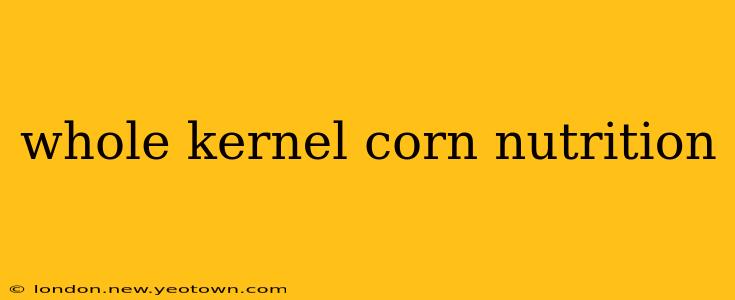Corn. It's a staple in many cuisines, showing up in everything from tacos to cornbread to sweet corn on the cob. But beyond its culinary versatility, whole kernel corn boasts a surprisingly impressive nutritional profile. Often overlooked in favor of more "trendy" vegetables, whole kernel corn deserves a spot on your plate and in your understanding of healthy eating. Let's delve into the details of this often-underestimated nutritional champion.
What are the Nutritional Benefits of Whole Kernel Corn?
Whole kernel corn isn't just a sweet treat; it's packed with essential nutrients. One cup of cooked whole kernel corn provides a good source of fiber, contributing to digestive health and helping you feel full and satisfied. It's also a decent source of several vitamins and minerals, including vitamin C, which is an antioxidant important for immune function, and folate, a B vitamin crucial for cell growth and development. Beyond these, it contains small amounts of potassium, magnesium, and iron. The beauty of whole kernel corn lies in its complex carbohydrate makeup, providing sustained energy release, unlike refined sugars that lead to energy crashes.
Is Whole Kernel Corn Good for Weight Loss?
This is a question many people have. While corn contains carbohydrates, it also offers valuable fiber. Fiber helps regulate blood sugar levels and promotes satiety, which can be beneficial for weight management. However, portion control remains key. Like any food, consuming excessive amounts of corn, even whole kernel, can contribute to weight gain. Think of it as part of a balanced diet, not a magic weight-loss bullet.
How Does Whole Kernel Corn Compare to Other Vegetables?
Compared to some leafy greens, whole kernel corn might be lower in certain vitamins and minerals. However, it excels in providing a good amount of fiber, often lacking in other vegetables. It also offers a distinct sweetness and a pleasing texture, making it a more palatable option for those who find some vegetables less enjoyable. The comparison isn't necessarily about "better" or "worse," but rather about diversity in your diet. A variety of fruits and vegetables, including whole kernel corn, contributes to optimal nutrient intake.
What are the Potential Downsides of Eating Whole Kernel Corn?
While generally healthy, whole kernel corn does have some potential drawbacks. It can be relatively high in carbohydrates, making it important for those managing blood sugar levels to consume it in moderation. Additionally, some individuals may experience digestive discomfort if they consume large quantities due to its fiber content. Starting with smaller portions and gradually increasing intake can help mitigate this.
Is Canned Corn as Nutritious as Fresh Corn?
Canned corn is a convenient option, but it may not retain the same nutritional value as fresh corn. The canning process can lead to some nutrient loss. However, canned corn still offers some nutritional benefits and is a better option than no corn at all, especially in seasons where fresh corn is unavailable.
How Can I Incorporate More Whole Kernel Corn into My Diet?
Adding whole kernel corn to your diet is easier than you think! Try it grilled on the cob, added to salads, incorporated into stir-fries, or used as a side dish. It can even be a tasty addition to soups and stews. Experiment with different recipes and find ways to enjoy its unique flavor and texture.
This exploration of whole kernel corn’s nutritional profile highlights its value as a versatile and nutritious food. Remember, a balanced diet is key, and whole kernel corn plays a valuable role in contributing to a healthy and varied eating plan. By understanding its nutritional benefits and potential drawbacks, you can make informed decisions about incorporating it into your own dietary routine.

